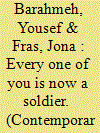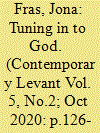|
|
|
Sort Order |
|
|
|
Items / Page
|
|
|
|
|
|
|
| Srl | Item |
| 1 |
ID:
190980


|
|
|
|
|
| Summary/Abstract |
In this article, we examine the use of war metaphors in Jordanian official discourse on the Covid-19 pandemic in 2020-21, through an analysis of videos of public statements and media releases made by Jordanian government officials at press conferences and interviews with local media outlets which were disseminated through social media. Against both the linguistic essentialism and the Western-centrism of conventional analyses of (war) metaphors, we demonstrate that Jordanian officials’ framing of Covid-19 as a security threat is not just a function of the rhetorical appeal of militarised discursive responses to the pandemic, but also aligns closely with existing ideologies of the militarisation and securitisation of public life. The mobilisation of metaphor in the context of the Covid-19 pandemic should thus be understood in relation to the specific discourses that pervade the communicative channels through which it is distributed.
|
|
|
|
|
|
|
|
|
|
|
|
|
|
|
|
| 2 |
ID:
175145


|
|
|
|
|
| Summary/Abstract |
Sound and spoken language play a major role in contemporary Islamic media. On Islamic advice programmes in Jordan, a genre of radio show in which listeners call in to the station with questions regarding pious Sunni Muslim conduct, broadcasters use language in ways that conveys authority to the Islamic textual tradition, and therefore presents their responses as legitimate advice for pious Muslims. By manipulating the language of quotations, broadcasters both ‘entextualise’ segments of language and develop dialogical relationships with Islamic texts – principally, the Qur’an and hadith literature – as well as the audiences addressed and co-present callers. Though the programmes provide a forum for public discussion of religious issues, a linguistic anthropological analysis nevertheless reveals the persistent asymmetry and exclusion inherent in this type of mediated interaction: hosts remain supremely authoritative dispensers of advice to lay callers, and the programme’s listenership is idealised as a pious Jordanian Sunni Muslim audience from which non-devout individuals are excluded. Details of communicative interaction must, therefore, be given careful attention when examining the role of religious media in the contemporary Middle East.
|
|
|
|
|
|
|
|
|
|
|
|
|
|
|
|
| 3 |
ID:
173358


|
|
|
|
|
| Summary/Abstract |
Questions of media form have not received sufficient attention in recent studies of Arabic-language media. In Jordanian radio today, however, media form is a highly relevant discursive resource for broadcasters, who strategically invoke the ways in which different types of media communication are conceived and framed, in a metapragmatic manner that goes beyond the impact of merely technical distinctions between media forms. This article examines two examples of this process: the ‘unification’ of radio station voices in a memorial programme for a martyred fighter pilot broadcast in February 2015, where radio’s limitation to sound was used ideologically to assert national unity; and references to digital media on morning talk show programmes, which allow hosts to define audiences and forms of participation in radio conversations. These metapragmatic framings of media form, further, produce specific publics for Jordanian radio: groupings that include, and legitimize, certain segments of listenership—such as ‘true’ Jordanians or ‘the Jordanian people’—while implicitly excluding others. Grounded firmly in discursive data, this article thus provides much-needed nuance to our understanding of mass media in the Arabic-speaking Middle East today—and, ultimately, the genuine significance of media form in its social and cultural context.
|
|
|
|
|
|
|
|
|
|
|
|
|
|
|
|
|
|
|
|
|